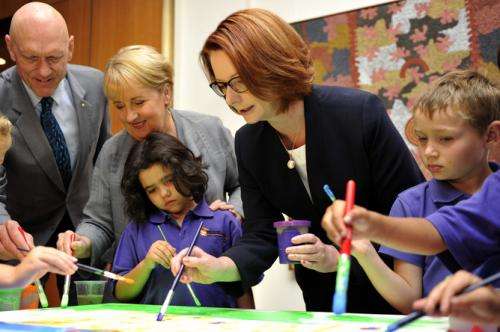Australia closing equity gap, but education performance slipping: OECD

Australia has managed to improve equity in education, but that hasn't stopped it slipping on performance according to new research from the Organisation for Economic Cooperation and Development.
The OECD analysed the link between a student's academic performance and their socio-economic background, based on test results from its Programme for International Student Assessment in 2009.
The research showed that across OECD countries socio-economically disadvantaged students are twice as likely to be among the poorest performers in reading compared to advantaged students.
Advantaged students score at a level that puts them around two years ahead of their disadvantaged peers, according to the analysis.
But the results also showed some countries are doing a better job at closing the gap, whilst maintaining performance, than others. These include Canada, Estonia, Finland, Hong Kong, China, Iceland, Korea, Liechtenstein and Norway.
Australia managed a small increase in equity in the years between 2000 and 2009, but saw a statistically significant decline in performance.
Australia sits alongside the US and New Zealand in the quadrant of countries with high performance and low equity levels.
Equity in education in Australia could be aligned with the outflow of public funds into private schools, said Dr David Zyngier, senior lecturer in the faculty of education at Monash University.
"With 35% of school children now going to private schools it's created substantial equity problems in the public sector."
Dr Zyngier added that the performance issue could not be solved without also addressing the issue of equity.
"Australia is still at a low equity level and we've seen a drop in our results over the last seven years."
However Dr Zyngier said the implementation of the Gonski recommendations for school funding could change the situation.
"It will have a significant impact because if extra funds are going to be targeting disadvantaged students, then those children who are dragging down the average over a period of time will improve in their results."
Changes in Australia's education performance have been fairly small, said Professor John Polesel, with equity the more important of the two issues for the country.
Professor Polesel, who teaches education policy at Melbourne University's Graduate School of Education, said one of the best ways to improve the results was to reduce poverty.
Dr Zyngier agreed.
"As Connell wrote in 1993 in Schools and Social Justice: "if a poor child wants to do well in education then they should have chosen richer parents".
"International research evidence indicates that the single most important factor impacting on a child's education outcomes is socio-economic status. In Australia in particular this factor is even more significant than other countries indicating the gap between equity and performance is indeed very large," Dr Zyngier said.
Australia had consistently done very well on the PISA performance, but it hadn't done consistently well in terms of equity, Professor Polesel said.
"When you compare it with countries that are quite similar, such as Canada, they seem to be doing the equity aspect of it more successfully than we are."
Professor Polesel also highlighted the funding issue, pointing out that countries we are often compared with fund schools differently.
Geographic segregation, with a concentration of students with a higher level of cultural capital in some schools than in others, was also an issue for Australia, he said.
"What we can say with some confidence is overall Australia's actually doing quite well.
"Of the countries that are ahead of us, most are Asian countries and you've got a different cultural view of what education is and how it works."
For example, Professor Polesel said, Korea puts considerable resources into private education through families paying for things like private tutoring.
Provided by The Conversation
This story is published courtesy of The Conversation (under Creative Commons-Attribution/No derivatives).



















